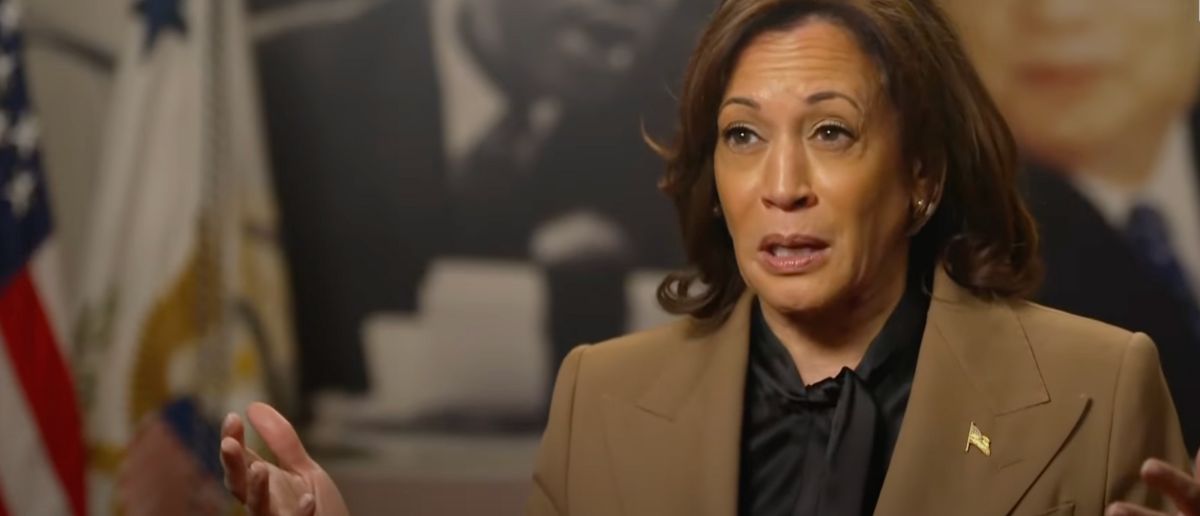
Vice President Kamala Harris thought she had Trump cornered. Not so fast.
And now Kamala Harris is blown away by who just exonerated Donald Trump.
Corporate media recently united in refuting former President Donald Trump’s claim that illegal immigration adversely affects “black jobs.” However, experts on the topic suggest that Trump’s assertion has a basis in reality, highlighting the complex interplay between immigration and employment within the black community.
During a Q&A session with the National Association of Black Journalists (NABJ), Trump claimed that millions of people crossing the border are taking jobs that would otherwise go to black Americans. His statement, reported by Politico, was met with significant criticism from media outlets, some of which argued that the concept of “black jobs” is a misnomer, while others cited experts to refute the claim as untrue. Nevertheless, there is evidence suggesting that illegal immigration can depress wages and employment opportunities in sectors where black Americans are heavily represented.
Andre Barnes, Historically Black Colleges and Universities engagement director at NumbersUSA, pointed out that immigration has been impacting black employment for over 200 years. Barnes cited historical instances, such as the labor shortages during the First World War that led factories to employ more black workers due to halted immigration. The 1924 Immigration Act, which significantly reduced immigration, corresponded with a period of increased black employment and economic power.
Analyzing The Impact of Illegal Immigration on Black Employment
To illustrate the ongoing impact, Barnes referred to the 2008 Immigration and Customs Enforcement (ICE) raid on a Smithfield Foods slaughterhouse in North Carolina, which resulted in the loss of 1,500 immigrant workers. Following the raid, the proportion of black workers at the factory surged from 20% to 60%, highlighting the direct competition between immigrant and black workers in certain industries.
Data from U.S. Customs and Border Protection (CBP) show over 2 million encounters at the southern border in fiscal year 2023. Since President Joe Biden took office, there have been 1.7 million known “gotaways” who evaded border patrol. Pew Research data from July indicates that most illegal immigrants come from Mexico and are heavily represented in low-skill sectors like agriculture, construction, and manufacturing.
E.J. Antoni, a research fellow at the Grover M. Hermann Center for the Federal Budget at the Heritage Foundation, supported Trump’s claim, noting that black workers, who form a significant part of the low-skill labor force, face increased competition from low-skill immigrant workers. This competition can lead to reduced wages and employment opportunities for black Americans.
Fewer Jobs for Blacks Followed By Lower Wages
A 2010 study by the U.S. Commission for Civil Rights found that immigration has a depressive effect on wages and employment in the black community due to the increased labor supply. The study noted that black Americans, who are disproportionately employed in low-skill jobs, are more affected by immigration than other groups.
Gordon Hanson, an urban policy professor at Harvard University and co-author of a 2006 National Bureau of Economic Research (NBER) study on immigration and black employment, emphasized that the impact of immigration on labor markets depends more on occupation and location than on demographic characteristics such as race or ethnicity.
Hanson explained that workers in declining local economies or those with education and experience levels that leave them vulnerable to economic shifts are disproportionately affected by immigration, regardless of their race.
The 2006 NBER study found that a 10% increase in the labor force due to immigration led to a 4% decrease in wages for black workers, a 3.5% decrease in employment, and a 0.8% increase in black incarceration rates. White workers also experienced wage decreases, but to a lesser extent, with a 4.1% decrease in wages, a 1.6% decrease in employment, and a 0.1% increase in incarceration.
The Biden administration has attempted to address the issue by limiting new asylum requests at the southern border if the daily average exceeds 2,500. Despite this, job growth touted by the administration heavily relies on immigrant labor, with foreign-born workers securing significantly more jobs than native-born Americans.
Trump spokesperson Karoline Leavitt emphasized the need to protect black workers from the adverse effects of illegal immigration, citing Bureau of Labor Statistics data showing a decrease in jobs for native-born Americans and higher black unemployment rates compared to when Trump was in office. Leavitt asserted that Trump’s proposed large-scale deportation operation aims to safeguard black employment, contrasting it with Vice President Kamala Harris’s stance on amnesty and citizenship for illegal immigrants.
Donald Trump’s Historic Slashing Of Black Unemployment
During Donald Trump’s administration, the black working class in America enjoyed one of the best jobs markets in the history of America. Black unemployment tanked to just 5.6% by 2019, before the pandemic panic completely rewrote history in almost every single way.
For reference, in 2015, overall unemployment was at 5.3%. Black unemployment in 2015 was 9.6%. Meaning, black unemployment outpaced overall unemployment to the tune of 81% after two terms of the Barack Obama administration.
That gap was not entirely closed during the Trump administration in 2019, but it was certainly narrowing. Black unemployment outpaced overall unemployment by only 50% by the end of 2019. Furthermore, the argument that Barack Obamas policies were only just having an impact in 2019 is bollocks considering Obama had two terms and there’s no policies Obama could point to that were actually helping improve market conditions for black Americans.
Stay tuned to the DC Daily Journal.





